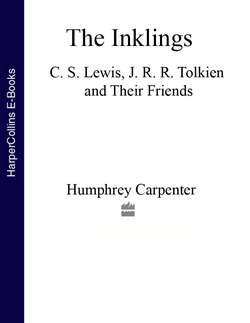Читать книгу The Inklings: C. S. Lewis, J. R. R. Tolkien and Their Friends - Humphrey Carpenter - Страница 7
ОглавлениеPREFACE
C. S. Lewis died in 1963, J. R. R. Tolkien in 1973, Charles Williams in 1945. In recent years the books of the first two have been immensely popular on both sides of the Atlantic, while Williams, though his name is far less well known, continues to exercise a considerable fascination to those who have encountered his writings.
These three men knew each other well. Lewis and Tolkien met in 1926 and soon achieved an intimacy which lasted for many years. Around them gathered a group of friends, many of them Oxford dons, who referred to themselves informally and half jestingly as ‘The Inklings’. When in 1939 Charles Williams found himself obliged to move from London to Oxford he was quickly taken into this circle, and was on close terms with Lewis and the others until his death.
The Inklings achieved a certain fame – or even notoriety, for they had their detractors – during the lifetime of the group. And when some years later it was noted that The Lord of the Rings, The Screwtape Letters, and All Hallows’ Eve (to name but three of many books) had this in common, that they were first read aloud to the Inklings, it became something of a fashion to study the writings of Lewis, Tolkien, and Williams on the assumption that they were members of a clearly defined literary group with a common aim. Such an assumption may or may not stand up to serious investigation. But in the meanwhile there has been no attempt to write any collective biography of the Inklings. This book tries to fill that gap.
It is based largely on unpublished material, and I am much in the debt of the various people who have made this material available to me. My acknowledgements to them and to the many others who have helped me will be found in Appendix D. As to quotations, their sources are fully identified in Appendix C, by a system which I feel is less intrusive than the conventional method of numerals referring to notes.
The book is largely concerned with C. S. Lewis; for, as I have argued in it, the Inklings owed their existence as a group almost entirely to him. I have also given an account, necessarily highly compressed, of the life and writings of Charles Williams. Of J. R. R. Tolkien’s life and work outside the Inklings I have said very little, because he has been the subject of an earlier book of mine, to which I have little to add.
I have tried to show the ways in which the ideas and interests of the Inklings contrasted sharply with the general intellectual and literary spirit of the nineteen-twenties and thirties. This has necessitated some discussion of their writings, particularly Lewis’s. In this sense the book sometimes strays from ‘pure’ biography into literary criticism. But I have deliberately avoided making any general judgement of these men’s achievement, for I think it is too early to try to do so. I have merely tried to tell their story.
H.C.
Oxford, 1978.
